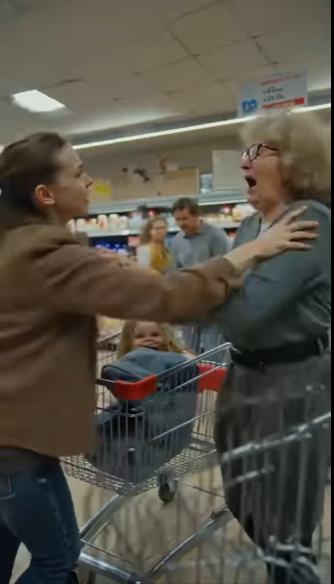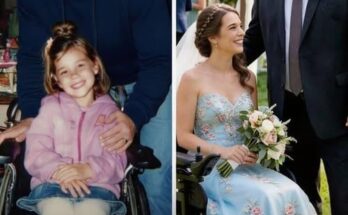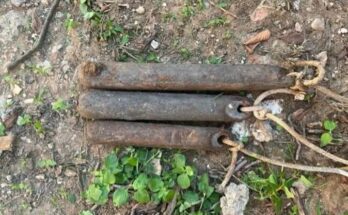
I was halfway down the toy aisle when I saw it—the Starlight Princess limited edition with the color-shifting gown and a tiny crown that lit up like a firefly. My seven-year-old, Mia, had been dreaming about this doll for months. She’d circled it in every flyer, whispered about it during bedtime prayers, and showed me grainy YouTube clips as if she were pitching a startup.
I’d been squirreling money away in a coffee tin—twenties from extra transcription pages, a crumpled ten here, a five there. Rent didn’t pause. The light bill didn’t flinch. Groceries kept marching. But one perfect present? My girl deserved that.
Marked down—$89 to $45. A tiny Tuesday miracle.
Mia squeezed my fingers, eyes huge behind her crooked headband. “Mama… is that really her?”
“That’s really her, bug.” I lifted the box. It had weight—the kind of weight that says, This time, you get the yes you’ve been waiting for.
“We can really buy it?” Her voice was careful, like hope might shatter if she set it down too hard.
“We can.” I smiled, and her whole face dawned.
That’s when a voice cleaved the aisle in two.
“Lena? Is that you?”
My mother could curdle fresh cream with a greeting. I turned. There she was, barreling toward us, face set in that familiar righteous fury. Behind her: my father, Earl, jaw clenched; my younger sister, Bree, steering a cart where her five-year-old twins perched in matching pink jackets that cost what my week of groceries cost.
“What are you doing here?” I asked, shifting instinctively so I stood between them and Mia.
“What am I doing here?” Mom snapped. “I live in this town. Unlike some people, I shop for my family.”
Before I could inhale, her palm cracked against my cheek. The sound ricocheted off linoleum. Mia screamed. I tasted blood where my teeth bit the inside of my mouth.
“How dare you,” my mother thundered, loud enough to make carts stall and heads swivel. “How selfish can one person be?”
I kept hold of the box. My cheek burned. Mia plastered herself to my legs, sobbing. A teenage employee froze mid-stride, unsure whether to keep coming.
Mom’s gaze pinned the doll like prey. Something ugly curdled into satisfaction. “You bought a toy for her?” She snatched the box. “While your sister’s girls go without?”
“It’s for Mia’s birthday,” I said, voice shaking. “Next week. I’ve been—”
“Mine!” Mia cried, reaching for the box. “Mama said—”
“Shut up, you ungrateful child,” my mother hissed—at a seven-year-old. Then she turned syrup-sweet and handed the doll to twin #1. “For you, baby. Grandma loves you.”
“I wanted the shinier one,” the twin pouted, pointing at the shelf.
“You’ll have both,” Mom declared. “Bree, add it.”
The kid employee hovered, gathering courage; a manager in a red vest was bee-lining over.
“Mom, please,” I said, hating the pleading in my voice. “It’s her birthday. I saved for months.”
My father’s hand clamped my shoulder, fingers digging through my thrift-store jacket. “Your sister has two children,” he growled, breath stale with coffee and cigarettes. “A real family. And you’re throwing money at junk for a spoiled only child?”
I looked at the twins’ brand-name boots, at the cart already half-full of treats. “Bree’s husband makes six figures. I type medical reports and clip coupons. This is $45. I’ve been saving since spring.”
“Don’t you talk to your father that way,” Mom snapped, looming, crowding. “After all we sacrificed for you.”
Phones came out. The aisle swelled with strangers’ eyes. Bree finally chimed in, faux-gentle: “Maybe if you’d married someone with a future instead of a grease-stained dreamer, you wouldn’t be here, Lena. Poor Mia.”
The ghost of my husband—dead three years now in a rain-slick accident—rose in my chest like heat. “Cal was a better person than any of you,” I said, quiet and sharp. “Do not say his name like that.”
Mom scoffed. “He was a mechanic. You dragged our family name through oil and mud.”
Dad yanked my arm. “Let’s see if you dare buy anything else for that kid.” He shoved us toward the doors. I pulled back; he was twice my size. Mia clung to my other hand, wailing.
“You’re hurting me!” I shouted. “Call—”
“You don’t deserve anything,” Dad spat, shoving us through the automatic doors into November wind. “You never did.”
The glass slid shut on their faces. The cold ripped through my jacket. Mia shook, crying into my stomach. My cheek throbbed where Mom’s palm landed; my shoulder ached under Dad’s grip.
And right there—under the strip mall’s flickering lights—I felt what little love I had left for those people evaporate, like rain on hot asphalt. Not a new story. A finale.
I was the older daughter who’d never matched Bree’s shine. The awkward bookworm to her prom queen charm. She got halos for bare minimums; I got punishments for existing imperfectly. She married a corporate attorney; my mechanic loved me on purpose. She got showers and strollers wrapped in tissue paper; I got a used playpen and a lecture. After Cal died, they decided I was defective. A burden. Not their problem.
But this? Slapping me, stealing from my kid, dragging us like thieves? This was the line.
I drove home with the taste of metal in my mouth and my daughter’s sobs fading to hiccups. That night, after I sang Mia to sleep and promised her I’d find a way, I sat at the kitchen table in the quiet and chose something I should’ve chosen a decade ago.
Enough.
I opened my laptop and wrote it all down: the slap, the theft, the shove; the words; the witnesses. Then I wrote the older ledger—years of favoritism and cruelty carved into my bones.
In the morning, I called three places.
First, a family attorney with five-star reviews and a steadiness in her voice I believed: Patricia Morgan. She listened. She asked smart questions. “Come in this afternoon.”
Second, the store. I asked them to preserve yesterday’s footage. The manager had seen enough; he promised to hold the recording.
Third, the non-emergency police line. “I want to file an assault report,” I said, and it sounded like standing up for the first time on a ship that had been tossing you for years.
By noon I was in Patricia’s office with ice on my cheek, my hands still shaking. She paged through my notes, watched the phone videos a stranger DM’d me, read the store incident log.
“What your mother did is assault and battery,” she said. “What your father did is assault. Taking the toy can be argued as theft under coercion. We can file criminal complaints and a restraining order. We can make this stop.”
“I don’t want revenge,” I said. “I want a boundary they can’t bulldoze.”
“Then we’ll build one with steel.”
The next days were a carousel of calls I didn’t answer. Mom’s voicemails swung from scolding to weepy to threats. It was just a doll. Families fight. You’ll regret this. I saved them all. Bree pounded on my door once, shouting that I was “ruining Christmas.” I called the police. They escorted her away and noted the active petition for a protective order.
The arraignment came fast. With clear video, employee statements, and three bystander clips, my parents took a plea. Reduced charges. Probation. Mandatory anger management. A no-contact provision that drew a bright circle my daughter and I could finally step inside.
At the restraining order hearing, the judge was a woman with gray hair and the patience of someone who’s seen every kind of family lie. She watched the video, listened to my attorney, skimmed my notes.
“I’m granting a permanent order,” she said, voice even. “Five hundred feet. Any violation is an arrest.”
My mother lurched to her feet. “Your Honor, please. She’s my daughter. It was a tiny slap—”
The judge’s eyes flinted. “I watched you strike your adult child across the face, seize a toy from your crying grandchild, and stand by while your husband dragged them into the cold. That’s not a ‘tiny slap.’ Sit down.”
Dad tried to approach me afterward. A bailiff appeared like a wall. “The order is active, sir.” I left without looking back.
The family grapevine lit up. Some relatives turned their palms up in false peace: Family is forever. Don’t do something you’ll regret. I blocked them. Others found me with their own stories—an aunt who’d been minimized, an uncle who’d gone no-contact twenty years ago and never looked back. I wasn’t the first. I’d only been the most visible.
Mia started therapy with Dr. Alvarez, who made playtime safe again. I started with Dr. Chen, who taught me the language for things I’d only known by ache. The nightmares dulled. Mia’s drawings shifted from dark scribbles to princesses with crooked crowns, to butterflies and big suns. She laughed more. She slept.
One week after everything blew up, I went back to the store for bread and bananas and courage. The same teen was thumbing inventory at the end of the aisle. He saw me and disappeared into the back. When he returned, he held a box out with both hands, like an offering.
“My manager asked me to give you this,” he said. “Corporate approved it. We’re sorry we didn’t step in faster.”
Inside: the Starlight Princess. And a card signed by six employees: We saw. We’re sorry. You and your daughter deserved better.
I sat in my car and cried until the windshield blurred.
Six months later, Mia turned eight. We had a party in our small apartment with people who knew how to love. My Aunt Mae brought a pan of cinnamon rolls that tasted like Sundays. Mr. Patel from 2B fixed Mia’s bike bell in the hallway between cake and candles. The doll sat on her dresser like a sentinel. Mia blew out candles, eyes bright. “Best birthday ever, Mama,” she said around frosting.
“Because we’re happy,” I said.
We were. Happiness is quieter than drama. It’s also sturdier.
Two weeks after her birthday, a letter arrived at my attorney’s office—forwarded to respect the order. Five single-spaced pages from my mother: How dare you. Look what you’ve done to this family. You’ll die alone. No apology. No ownership. Only theater.
I read it once and fed it to the shredder. Grief can be an exit ramp.
I got a raise that spring, enough to move us into a place with trees out front and a kitchen that didn’t hum like a fluorescent office. Mia joined art club and soccer. I started seeing someone—Evan, a cardiac nurse with quiet hands and a gentle laugh. He learned Mia’s favorite snack and where I kept the extra dish towels. We took it slow. There was no rush; there was only care.
Through the grapevine: Dad’s demotion after HR learned about the probation. Mom’s shrinking circle as more relatives peeled away. Bree’s marriage wobbling under the weight of appearances cracked open. I didn’t gloat. I didn’t grieve it either. Consequences aren’t curses; they’re math.
Two years passed. We bought a small house with a lilac bush that insisted on blooming even when the weather sulked. Mia, nine then, taped her art to purple walls and arranged her books by color. The doll sat on a shelf—not a toy anymore, a marker. A we chose different totem.
One Saturday, flipping pancakes, Mia padded in. “I had a weird dream,” she said, hair wild, voice clear. “Grandma said sorry. And I forgave her.”
“How did it feel?” I asked.
“Strange. Because I don’t think I would. Is that bad?”
“No, baby,” I said. “Forgiveness isn’t an invoice. You don’t owe it. You can give it if you ever want to. You can keep it if you don’t.”
“Do you forgive her?”
“Maybe someday. Maybe never. Right now I’m busy being happy.”
She nodded. “I love our family.”
“Our chosen family,” I said.
“Yeah,” she grinned. “The one we picked.” She peered into the bowl. “Chocolate chips?”
“Obviously.”
Years turned. Mia grew, as children insist on doing. I got promoted again. Evan became husband, then stepdad, then simply Dad in the way that matters: everyday consistency. We had another daughter, June, who learned to toddle toward lilacs and say “more, please.”
Five years after the aisle, Hannah wrote from a hospice address. Mom is dying. Two weeks. She wants to see you and Mia. Please come. Don’t do something you’ll regret.
I carried that letter around for three days like a stone. Therapy helped. Evan listened. Mia—fourteen and old-soul wise—asked, “Do you want to go?”
“I don’t know,” I said. “Part of me thinks I should. Part of me knows it won’t change anything.”
“Then don’t,” she said. “She never said sorry. You don’t owe your peace to someone who hurt you.”
I wrote back: I hope she finds peace. I won’t be coming. Please respect our boundary. My mother died two weeks later. I didn’t go to the funeral. Neither did two relatives who’d long ago stepped away from the same fire.
Grief came—not for the mother I had, but for the one I didn’t. I let it pass through like weather. Then I set the table for dinner and lit a candle and called the girls in to wash hands.
Every year on Mia’s birthday, I look at the doll. She doesn’t play with it now. She’s into sketchbooks and sneakers and late-night talks about college. But we keep the doll because it’s proof.
Proof that a $45 toy revealed a fault line. Proof that a slap in a grocery store was a final sentence on a paragraph that needed ending. Proof that walking away is not cruelty; sometimes it’s the bravest love you can offer a child. Proof that justice is not revenge; it’s a door you close and lock, then decorate with a wreath.
They thought they won that day. They took a doll and tried to bury me under shame. What they handed me was clarity. I chose us. I’d choose us again in every version of this life.
Sometimes, the strongest thing you can do is put the box down, take your child’s hand, and leave. Sometimes, the happiest ending is not going back.


